The overlap of team ropers into all aspects of the equine industry is a natural occurrence. There are thousands of ranches, breeding programs and training operations for all types of performance horses and racehorses. Certainly, the racehorse industry is by far the most glamorous and largest sector of the horse industry. The sport is old, the tales are many, and there are endless stories of the people and horses involved in that industry. Team roping is not far behind though, as the WSTR Finale continues to be the third-richest paying horse event in the world. Most often, we hear about the horses—but the champion jockeys are indeed one of the most important icons of the sport.
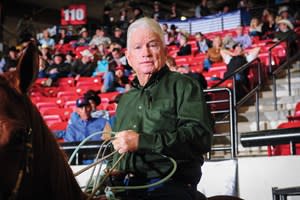 Bobby Adair
Bobby AdairRacing lost an all-time great this past summer with the passing of Bobby Adair. Adair was the first jockey ever inducted into the AQHA Hall of Fame. After a large contingent of team roping buddies gathered to eulogize him, The Roper decided it would be a good time to highlight his remarkable career along with a few of the other racing champions who share a love for team roping. These four men have sustained the rigors of being professional athletes—maintaining long careers and rising to the top—then seamlessly transitioned into the roping social order. The Roper is honored to have these champion jockeys as an integral part of our sport.
JOHNNY COX
Johnny Cox, an avid team roper—and a WSTR Legacy member—started his career as a jockey at a young age.
“They built a track next to our house in Spicewood, Texas, and my neighbor had a Shetland pony that he felt was real fast, so we took him up there and run him, and that’s how it all got started,” he said. “I was 14 years old.”
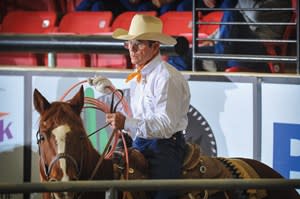 Johnny Cox
Johnny CoxCox, who now lives in Alto, N.M., competed in rodeo during high school, but found he could make more money and have more of a career in racing. He was a jockey for 23 years, winning the All-American Futurity (the most prestigious race offered for 2-year-old Quarter Horses) in 1971 on a horse called Mr. Kitcharge. They set a track record that held for 11 years. That same year he also won the Rainbow Futurity at Ruidoso (N.M.) Downs.
But maintaining a career as a jockey is difficult and very demanding.
“I ended up retiring from racing because as I got older, it just got harder and harder to make the weight,” he said. “I was always really heavy in jockey terms, and I was about the weight I am now, which is 13 pounds too heavy. I got tired of feeling bad all of the time, and I knew it was one of those things you can’t do forever.”
Once his jockey career was over, Cox raised registered Red Brangus cattle, and at one point was managing 29 ranches scattered throughout Central Texas.
But even throughout his racing and ranching careers, he always had a love for team roping. When he was 19 years old he bought a rope horse and competed in jackpots around the central Texas region. He developed a passion for the sport, but often the demands of racing were too much.
“I quit team roping for about six years, from 1991 to 1997, because work was too busy, but I started going more regularly in 1997, when you could win money in amateur roping,” he said.
As his ranching commitments tapered off, Cox has found more time to rope. In 2011, he placed fifth in the #10 Finale with partner Westi Hicks, Deming, N.M., worth $60,000.
“It was a lot of years apart, about 40, but I have actually won more money team roping than I did when I won the All-American,” he said.
But Cox still misses the big races.
“There was nothing more fun than winning the All-American,” he said. “But when you can play for $150,000 (roping), it brings that same level of excitement.”
G.R. CARTER
One of the most famous and influential Quarter Horse jockeys of the past few decades is G.R. Carter, Oklahoma City, Okla. A cowboy at heart, Carter wanted to rodeo long before he ever had an interest in becoming a jockey.
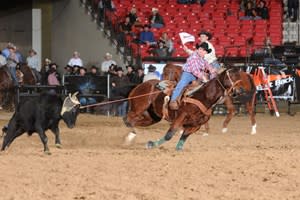 G.R. Carter
G.R. Carter“When I was growing up, my dad was a steer roper,” he said. “I went to the steer ropings as a kid and idolized guys like Roy Cooper, Phil Lyne, Walt Arnold and Arnold Felts. My heroes were cowboys.”
Carter didn’t get into horse racing until he accepted his first job at Galvan Race Horses—the summer of his eighth grade year—hired because he was small and might have a chance to ride the horses. He took that job in order to fund his junior rodeo entries, not realizing that it was soon to become his life. He was immediately riding in races. Upon graduating high school, his official career as a jockey commenced, and he hasn’t looked back since. In fact, Carter is still racing today, some 30 years later.
But don’t let this humble jockey fool you. Not only has he been racing for three decades, he has broken almost every record in the books. With more than $70 million in lifetime earnings, Carter is the all-time leading money earning jockey in American Quarter Horse racing history. In 2014, he became the all-time leader in wins aboard American Quarter Horses, winning 3,632 races and there doesn’t seem to be any jockeys in this generation within striking distance of his record.
Even with his spectacular racing career, Carter never lost his love for team roping.
“When I first started high school I kept one team roping horse and would do my best to try to go to the jackpots one or two nights a week,” Carter said. “I would get home at 2 a.m. and have to be at the track at 6 a.m., and I was just a kid trying to get started riding in races. I decided to sell my horses and did not pick up a rope for eight years. By the mid-90s my career was rolling. I had moved back to Oklahoma and was able to start roping again.”
Carter first competed in the USTRC and added an elite team roping championship to his name when he finished first place in the WSTR Finale II #14 Pro-Am with the young Cody Doescher to pocket $80,000.
“Even though I had success in the horse racing world, I still wanted to participate in the cowboy world somehow,” Carter said.
Carter has competed at every Finale since his 2007 victory and will be at the South Point once again for Finale X.
BOBBY ADAIR (1953-2015)
Bobby Adair always knew he wanted to be a jockey.
“From the time he was 8 years old, he was racing horses down the road in Oklahoma,” said his wife, Linda. “He always knew it was what he wanted to do.”
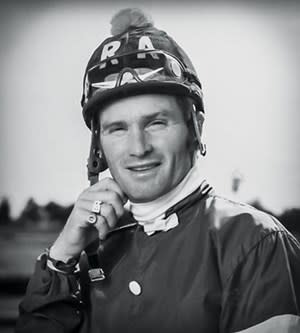 Credit: Andrea Caudill Photo Bobby Adair
Credit: Andrea Caudill Photo Bobby AdairAdair graduated from high school in Hagerman, N.M., in 1961 and began his riding career at Ruidoso Downs that same summer, later riding winners at La Mesa Park, Sunland Park and at the state fair competition in Albuquerque. Throughout the 1960s he rode at various tracks in Texas and Colorado, ultimately competing from New York to Washington. In 1963, he moved to California where he became the leading rider at Los Alamitos for six consecutive years. Nicknamed “The Master,” he still holds almost all of the records at that track, including most wins, most wins in a single meet and most stake victories. Los Alamitos has even named a race in his honor.
He became the number-one Quarter Horse jockey in America for five consecutive years—from 1968 through 1972—and was the first jockey to get inducted into the American Quarter Horse Hall of Fame, after winning 3,000 races and nearly 200 stakes wins. After suffering a horrific accident in 1984, where he shattered his shoulder, his racing career was over. But still, his love of horses never waivered. He was an avid WSTR Legacy roper who graced many of the California qualifiers from his home in Springville, Calif., and made numerous trips to Las Vegas to compete in the Finale.
Adair even received a shout-out from Hall of Fame trainer Bob Baffert minutes after winning the 2015 Kentucky Derby. Baffert said during an interview with NBC that he dedicated American Pharoah’s victory “to a friend of mine, Bob Adair, who isn’t doing too good right now.”
Sadly, on May 16, 2015, Adair passed away after a battle with cancer. But the kid who once raced his horses on the red dirt roads of Oklahoma created a lasting legacy in the horseracing world.
DANNY CARDOZA
Danny Cardoza has always been driven by challenge and competition. He first started roping at 8 years old, following in his father’s footsteps. It wasn’t until his senior year of high school that the AQHA Hall-of-Famer decided to become a jockey.
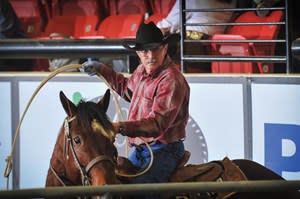 Danny Cardoza
Danny Cardoza“We started roping as little kids, and we used to rope everything: the dogs, chickens, cats, anything that wanted to walk, we roped it,” Cardoza laughed. “I was a senior in high school and I was the smallest kid in school, from a freshman all the way up to seniors. That’s when I knew it was something I wanted to do.”
At 18 years old he embarked on what would become a successful 26-year career—winning more than 3,000 races and riding earners of more than $22 million. Cardoza won the All-American Futurity in 1979. He also rode the world champion Quarter racehorse Dashs Dream, sired by Dash For Cash, who went undefeated as a 3-year-old.
“I was really fortunate,” Cardoza said. “I rode a lot of good horses.”
In 1991, he retired from racing, but couldn’t leave the business. Cardoza became a trainer and amassed an equally impressive list of accolades.
“I trained Quarter Horses for nine years at Los Alamitos and Ruidoso, and got lucky,” he said. “In the nine years I trained, I had 11 champions.”
When he quit riding, Cardoza was breaking and training horses for Dr. Ed Allred at his ranch.
“I really missed riding then, but when I started training at the racetrack, I realized what I had really missed was the competition,” he said. “It’s the same way with team roping. I love the competition, and with the number system the way it is now, it equals the playing field so we all have a chance.”
Horses have continued to fuel Cardoza’s strong desire for competition.
“Horses have always presented a challenge to me,” he said. “Every horse is different, and there are little quirks and traits you can learn about them to make them better. I like the feeling of conquering a goal. Training horses, racing horses and team roping have all been a challenge and a thrill.”








